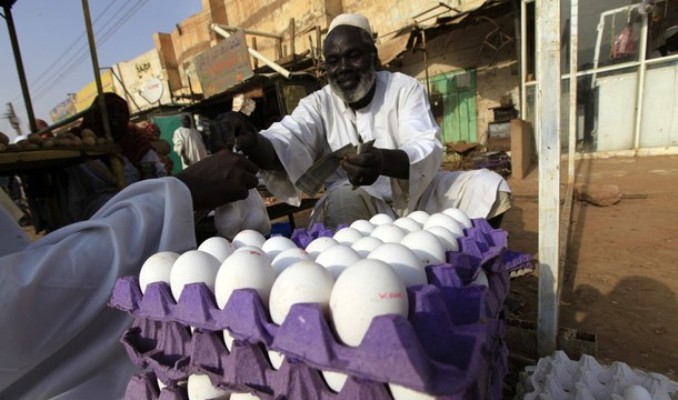Inflation in Sudan rise to 66,94%, as US dollar price pushes up

September 16, 2018 (KHARTOUM) – Sudan’s inflation rate has risen to 66,82% in August compared to 63,94% in July, reported the Central Bureau of Statistics (CBoS) in its monthly bulletin on Saturday.
Economic conditions in Sudan have been challenging since the secession of South Sudan in 2011 and the loss of the bulk of oil production and exports.
The withdrawal of South Sudan oil has compounded the difficult external environment, including debt arrears, limited access to external financing, U.S. sanctions, and the withdrawal of correspondent bank relations.
It is noteworthy that the director of the Troubled Currencies Programme at Johns Hopkins University Steve Hanke said Sudan’s annual inflation rate measured for 6/13/18, was 111%.
The government seeks to achieve an average inflation rate of 19,5% by the end of the 2018 fiscal year compared to 34,1% in 2017.
The high inflation rate and the general increase in price levels coincide with a significant rise in the U.S. dollar price against the Sudanese pound.
DOLLAR PRICE CONTINUES TO RISE
Meanwhile, the price of the US dollar has increased on the black market in Khartoum on Sunday, settling at 45,0 Sudanese pounds (SDG).
Last month, the dollar price hit an all-time high on the black market as the Sudanese pound declined to 47,0 per dollar. But the dollar slipped to 38,0 pounds ahead of Eid al-Adha holidays.
Traders speaking to Sudan Tribune Sunday in central Khartoum said selling price of the dollar settled at 45,0 pounds as the purchase price reached 44,1 pounds compared to 42,0 last week.
They pointed to short supply and high demand for the dollar, expecting dollar price to increase during the next period.
A trader, who spoke to Sudan Tribune on the condition of anonymity, said the government is behind the recent increase in dollar price as it has purchased large amounts of dollars to meet the needs of wheat imports.
Last February, the government introduced a number of measures to curb the rise in dollar price including limiting cash withdrawal from banks to absorb liquidity, cracking down on black market Forex traders and restricting imports.
Also, the CBoS revoked business licenses of a number of gold trade companies saying the decision was prompted by their involvement in currency speculations.
The Sudanese pound lost more than 100% of its value since South Sudan’s secession in 2011, pushing inflation rates to record levels given that the East African nation imports most of its food.
In rare statements last July, Ministry of Finance and Economic Planning acknowledged an acute shortage of foreign exchange saying it has aggravated the economic crisis.
The most recent International Monetary Fund (IMF) report indicated that Sudan’s foreign reserves cover approximately one and a halfmonth of imports.
(ST)
